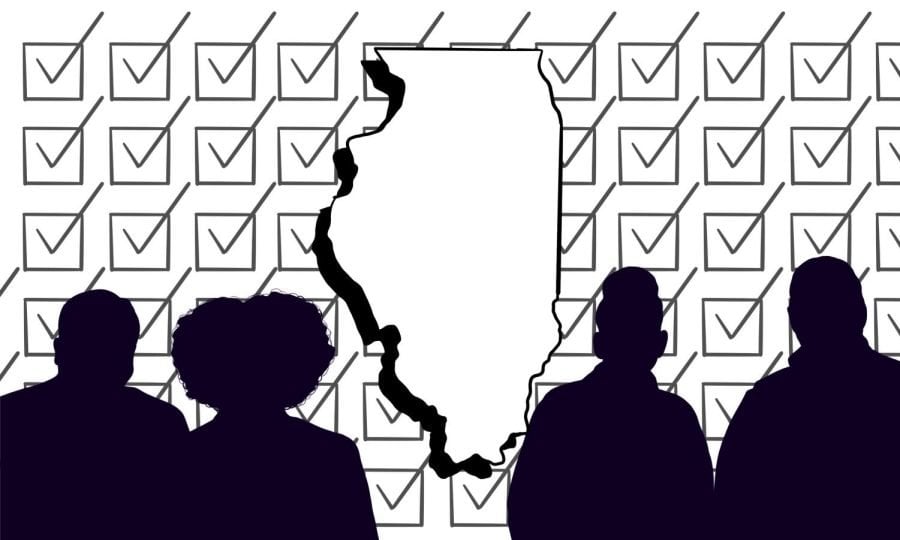Darren Bailey’s gubernatorial party nomination signals a rightward shift in Illinois GOP, experts say
File Illustration by Olivia Abeyta
Many believe that Republican Darren Bailey’s nomination for governor reflects a rightward shift in the Illinois Republican Party.
October 11, 2022
Darren Bailey’s nomination as the Republican gubernatorial candidate in Illinois has led experts to consider the future of the state GOP.
Bailey, a state senator from Xenia, Ill., defeated Aurora mayor Richard Irvin and venture capitalist Jesse Sullivan in the June primary with 58% of the vote. He has been endorsed by former President Donald Trump and will face Gov. J.B. Pritzker (D) in the general election on Nov. 8.
Experts, including Chicago Tribune chief political reporter Rick Pearson, view Bailey’s victory over more moderate candidates as evidence of a rightward shift in the Illinois GOP.
“The Republican Party for the past couple of decades has moved ever closer to the right,” Pearson said. “The party used to be run by basically fiscally conservative, socially moderate Republicans… But as we’ve seen over the past, and accelerated in recent years, the party isn’t interested in social moderates anymore.”
Bailey has built his political platform around criticizing Pritzker’s COVID-19 response, making headlines in 2020 for refusing to wear a mask during a legislative session and suing the governor over his stay-at-home order.
Chicago crime has also been a focus of Bailey’s gubernatorial campaign. In 2019, he co-sponsored a resolution in the Illinois House to separate Chicago from the rest of the state and has frequently referred to the city as a “hellhole.”
Jeff Fiedler, the executive director of the Chicago Republican Party, said part of this conservative turn among Illinois Republican constituents can be attributed to Trump. Fiedler said he sees similarities between Trump and Bailey’s ways of communicating with voters.
“(Bailey’s) style of plain speaking…and addressing issues in ways that people could understand them without having to get too far into the weeds…the people that voted for him like that,” Fiedler said.
With a focus on socially conservative issues, Bailey is “certainly not in the mold of (Bruce) Rauner or Irvin,” Kent Redfield, prof. emeritus of political science at the University of Illinois Springfield said.
Bruce Rauner, the former Republican governor of Illinois, lost his bid for reelection against Pritzker in 2018 by 16 percentage points. Many Republicans grew frustrated with Rauner after he struggled to get his agenda through the Democratic state legislature.
Rauner’s support from the Republican base and conservative donors was further stymied when he signed a bill in 2017 expanding abortion coverage for Medicaid recipients in Illinois. In comparison to Rauner, Bailey calls himself “proudly pro-life” and has come under fire for comments he made in 2017 comparing abortion to the Holocaust.
However, in last Thursday’s gubernatorial debate, Bailey said that there would be little he could do to change Illinois’ abortion laws as governor.
Pearson said Bailey’s nomination might spell danger for moderate Illinois Republican candidates in competitive elections this fall.
“Republicans had been hopeful that they could start making some gains this year,” Pearson said. “But there’s a lot of concern with Bailey’s performance, whether he’s the guy that could actually help in some of these competitive down ballot races where Republicans could win seats.”
During their debate Thursday, Pritzker and Bailey offered opposing views on the SAFE-T Act, a comprehensive criminal justice reform package that Pritzker signed into law in 2021. With just under a month until Election Day, the two candidates are set to debate again in Chicago on Oct. 18.
Pearson said the outcomes of this election will reflect the current state of the Republican party in Illinois.
“When the dust settles on Nov. 9,” he said, “the question becomes ‘Where goes the Republican Party?’ and ‘What is left of the Republican Party?’”
Email: [email protected]
Twitter: @katewalter03
Related Stories:
— Illinois gubernatorial candidates Pritzker and Bailey debate cash bail












